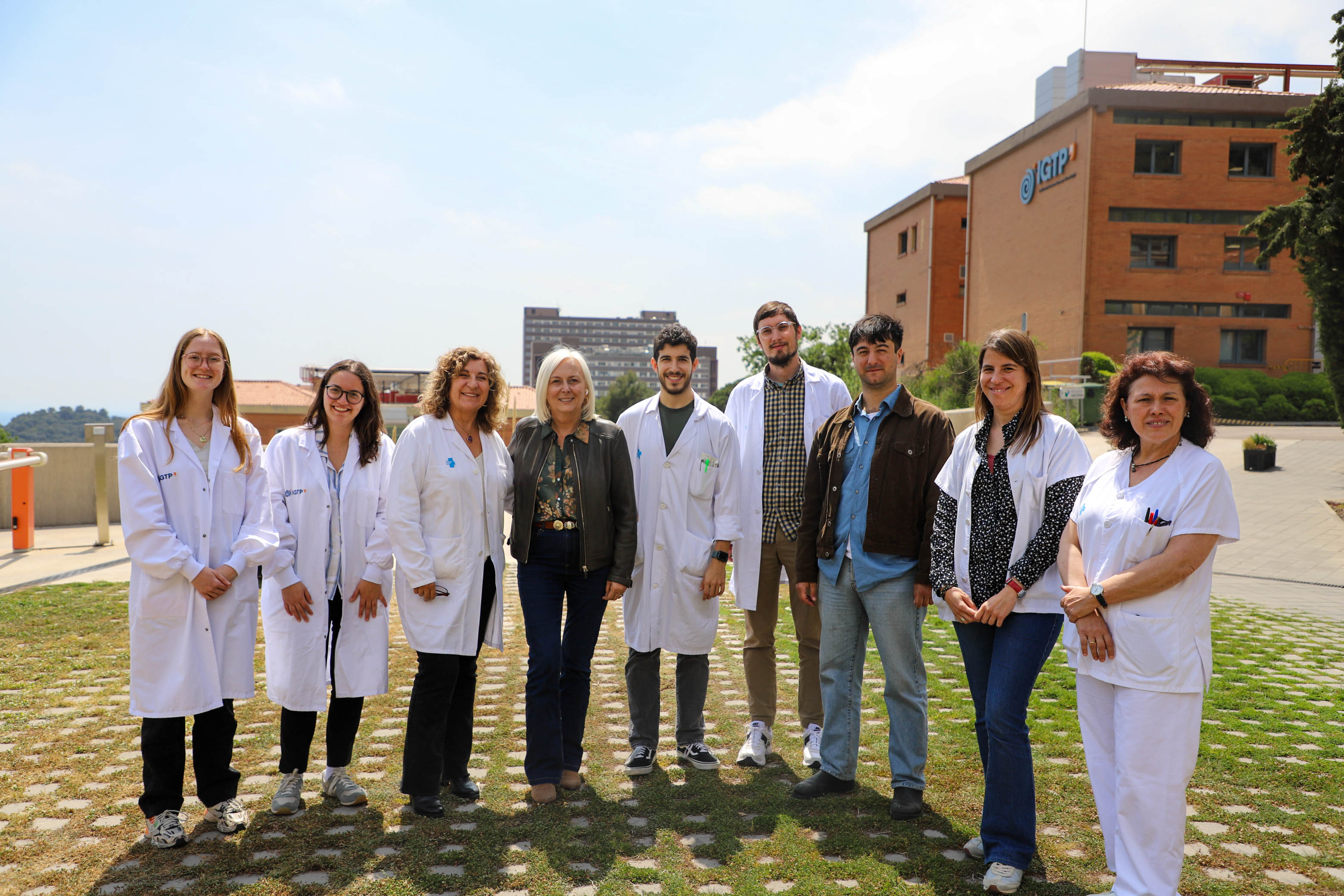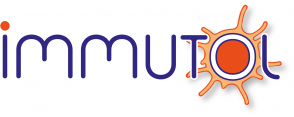Presentació
El Grup de Recerca en Immunopatologia es troba al Servei de Immunologia de l'Hospital Universitari Germans Trias i Pujol. El grup està integrat per un equip multidisciplinari amb molta experiència i molt motivat per a dur a terme recerca traslacional i donar suport als equips assistencials que estan desenvolupant els seus propis projectes de recerca per a estudiar els mecanismes de la resposta immunitària en diferents malalties.
En el laboratori, el grup compta amb serveis avançats de diagnòstic de immunopatologies que inclouen: autoimmunitat, al·lèrgies, immunoquímica, immunologia cel·lular, immunodeficiències, histocompatibilitat i diversos panells per a la vigilància immunològica de malalties immunitàries i tractaments immunitaris (fàrmacs immunomoduladors, anticossos monoclonals, teràpies cel·lulars i altres procediments immunoterapèutics). El seu laboratori clínic pertany al Laboratori Clínic de l'àrea Metropolitana Nord de Barcelona, i és un laboratori certificat (ISO 9001:2015) i avançat en l'aplicació de l'acreditació de les normes UNE-EN ISO 15189. Des de 2008, el grup ha desenvolupat nous tractaments inductors de la tolerància immunitària.
L'equip està integrat per immunòlegs, investigadors postdoctorals, investigadors predoctorals i tècnics que s'ocupen de prestigiosos projectes de recerca nacionals i internacionals. El laboratori és un dels 25 centres d'excel·lència europeus reconeguts per la Federació de Societats d'Immunologia Clínica (FOCIS). Des de 2009 està reconegut com a Grup Consolidat per l'Agència de Gestió d'Ajudes Universitàries i de Recerca (AGAUR) de la Generalitat de Catalunya. El director del grup va ser també el coordinador d'una xarxa europea COST integrada pels grups més importants en el camp de les teràpies cel·lulars tolerogèniques per a l'autoimmunitat, les al·lèrgies greus i els trasplantaments (European Action COST BM1305-AFACTT).

Líder/s de grup
- Eva Mª Martínez Cáceres
Eva Mª Martínez Cáceres
Investigadora principal i cap del Departament d'Immunologia.
Contacte: emmartinez.germanstrias(ELIMINAR)@gencat.cat
ORCID: 0000-0002-6762-8025
Equip
Investigadora principal
Cristina M Ramo-Tello(ELIMINAR)
Investigadors postdoctorals
Luis Soria, PhD(ELIMINAR)
Federico Fondelli, PhD(ELIMINAR)
Estudiants de doctorat
Jana Willemyns(ELIMINAR)
Hendrik Veltman(ELIMINAR)
Alex Agúndez-Moreno(ELIMINAR)
Gestió de laboratori
Berta Arcos Ribas(ELIMINAR)
Tècnica
Maria Corredera Garcia(ELIMINAR)
Línies de recerca
Innovació i immunologia diagnòstica
La immunologia clínica moderna ha de traduir les noves possibilitats terapèutiques en un tractament personalitzat optimitzat. Això requereix conèixer l'estat immunològic dels controls sans i dels pacients en diferents situacions patològiques per a la selecció del millor tractament i el monitoratge de la seva eficàcia. L'objectiu d'aquesta línia de recerca és identificar nous biomarcadors per al diagnòstic o el seguiment de la resposta al tractament i implementar panells immunofenotípics funcionals per a pacients amb malalties immunomediades i/o en tractament amb teràpies que afecten el sistema immune.
Actualment, hi ha diverses línies de recerca en curs:
- Valors normals dels paràmetres immunològics (Dr. A. Teniente Serra)
- Seguiment immunològic de pacients de la Unitat de Cures Intensives (UCI) (Dr. B. Quirant Sánchez)
- Seguiment de les respostes immunes de pacients amb SARS-CoV-2 i Long COVID (Dr. B. Quirant Sánchez)
- Immunologia del trasplantament (Dr. M. Iglesias-Escudero)
- Immuno-oncologia (Dr. J. Climent Martí)
- Neuroimmunologia (Prof. E. Martínez-Cáceres i Dr. C. Ramo Tello)
- Mecanismes de tolerància immunològica (E. Martínez-Cáceres)
Recerca en epidemiologia clínica
L'objectiu és comprendre la immunopatologia de les malalties immunomediades, el valor predictiu i la patogenicitat, així com els valors diagnòstics i/o pronòstics dels marcadors cel·lulars serològics i genètics disponibles.
Teràpies immunitàries que indueixen tolerància
L'objectiu és desenvolupar estratègies terapèutiques per restablir la tolerància immunològica als autoantígens (en malalties autoimmunes), als al·lèrgens (en al·lèrgies severes) i als al·loantígens (en trasplantaments). Actualment, el grup se centra en teràpies innovadores per a malalties autoimmunes del sistema nerviós central (esclerosi múltiple) i el trasplantament renal.
Neuroimmunologia: teràpia de tolerància cel·lular per a l'esclerosi múltiple
Codirigit per la Dra. C. Ramo Tello, cap de la Unitat d'Esclerosi Múltiple al Departament de Neurociència, i E. Martínez-Cáceres
A partir d'estudis in vitro en un model de ratolí d'esclerosi múltiple (encefalomielitis autoimmune experimental), el grup ha desenvolupat un producte cel·lular autòleg tolerogènic que consisteix en cèl·lules dendrítiques derivades de monòcits amb VitD3 de pacients amb esclerosi múltiple. Aquesta teràpia va ser aprovada per l'Agencia Española de Medicamentos y Productos Sanitarios (AEMPS) i es va dur a terme un assaig clínic de fase I d'escalat de dosis, mostrant seguretat, tolerabilitat i viabilitat. Actualment, el grup està preparat per iniciar un assaig de fase II (ja aprovat per l'AEMPS).
Projectes actius
El sistema immunitari al llarg de la vida: Base per a una medicina personalitzada
PI: Aina Teniente Serra
Funding agency: JMC Legacy Research Fund of Germans Trias i Pujol University Hospital
Agency code: 2022_51
Duration: 2.5 years
Inmunomonitorización de los biomarcadores CD64 y HLA-DR para el estudio de sepsis en el paciente crítico
PI: Fernando Arméstar. Collaborator: B Quirant
Funding agency: JMC Legacy Research Fund of Germans Trias i Pujol University Hospital
Agency code: 2022_58
Duration: 2.5 years
Selección de la mejor terapia en melanoma BRAF mutado: impacto de la heterogeneidad tumoral en la validación de marcadores y de la plasticidad celular en la adquisición de resistencia a terapia dirigida
PI: Anna Martínez Cardus. Collaborator: Joan Climent Martí
Funding agency: Instituto de Salud Carlos III (ISCIII)
Agency code: PI23/00421
Novel approaches to dissect mechanisms of immune tolerance and develop novel biomarkers in multiple sclerosis
PI: Eva Martínez Cáceres
Funding agency: Instituto de Salud Carlos III (ISCIII)
Agency code: PI23/00158
HORIZON-HLTH-2022-DISEASE-06-02-two-stage. Advanced Antigen-Specific Dendritic Cell-Based Therapy to Re-establish Tolerance in Immune-Mediated Diseases (IMMUTOL)
WP leader: Eva Martínez Cáceres
Funding agency: EU Framework Programme for Research and Innovation
Duration: 2023 - 2026
H2020 -MSCA-ITN-2023. Innovative applications of extracorporeal photopheresis in solid organ transplantation
PIs: Maria Iglesias Escudero, Eva Martinez-Caceres
Funding agency: EU Framework Programme for Research and Innovation
FWO-TBM. Treatment of multiple sclerosis patients with VitD3 tolerogenic dendritic cells. Phase II trial
PIs: Nathalie Cools, C Ramo Tello, E Martinez Caceres
Funding agency: EU Framework Programme for Research and Innovation
Agency code: T002523N
Manipulation of inflammation as a strategy to induce immunological tolerance: towards personalized immunotherapy in chronic autoimmune diseases
IP: Cristina Ramo Tello
Funding Agency: ISCIII
Agency code: PI21/00944
Duration: 2022 – 2025
Identificación y validación de biomarcadores de diagnóstico, pronóstico o manejo terapéutico
IP: Cristina Ramo Tello
Funding Agency: ISCIII
Agency code: RD21/0002/0021
Duration: 2022 - 2025
Immunomonitorització del Transplantament Renal
PI: María Iglesias Escudero
Funding agency: JMC Legacy Research Fund of Germans Trias i Pujol University Hospital
Agency code: LE207
Duration: 2025 - 2028
Projectes anteriors
Immunoterapia con células dendríticas tolerogénicas en esclerosis múltiple. Estudios preclínicos e immunomonitorización
PI: Eva Martínez Cáceres
Agency code: FIS21000
Duration: 2015 – 2018
Inducción de TOLERancia con células dendríticas tratadas con VITamina D3 y cargadas con péptidos de mielina, en pacientes con Esclerosis Múltiple: TolerVit-MS
PI: Cristina Ramo
Agency code: PI16/01737
Duration: 01/01/2017 – 30/06/2021
Neuronal self-renewal by antigen-specific tolerization in multiple sclerosis reinstalling the balance between inflammation and regeneration
PI: Eva Martínez Cáceres
Agency code: EUR44500
Duration: 2018 – 2022
Caracterización molecular de células dendríticas tolerogénicas en condiciones de inflamación crónica. Del laboratorio a la clínica, y vuelta al laboratorio
PI: Eva Martínez Cáceres
Funding Agency: ISCIII
Agency code: Pl20/01313
Duration: 2021 – 2024
INnovative Training in Myeloid Regulatory Cell Therapy (INsTRuCT)
IP: Eva Martínez Cáceres
Funding Agency: European Commission. H2020-MSCA-ITN-2018. Health, demographic change and well-being
Agency code: ITN00l00.PI (Spain)
Duration: 01/01/2020 - 31/08/2024
Inducción de Tolerancia: Nuevas vías y dianas terapéuticas
PI: Eva Martínez Cáceres
Agency code: FIS36400
Duration: 2018 - 2020
A negative dendritic-cell based vaccine for the treatment of multiple sclerosis: a first-in-man multicenter trial
PI: Eva Martínez Cáceres
Agency code: IWT17400
Duration: 2015 - 2019
Use of spectral flow cytometry for the deep characterization of innate immune cells in progressive MS
PI: Aina Teniente Serra
Funding Agency: Spanish Network of Multiple Sclerosis
Agency Code: REEM
Duration: 2020 – 2021
Immunological profile of risk in COVID19
PI: Aina Teniente Serra
Funding Agency: ISCIII
Agency code: COV20_00388
Duration: 2021 – 2022
Neuronal Self-Renewal By Antigen-Specific Tolerization In Multiple Sclerosis Reinstalling The Balance Between Inflammation And Regeneration (RESTORE)
PIs: Eva Martínez Cáceres, Cristina Ramo Tello
Agency code: 779316
Duration: 01/01/2018 - 31/12/2022
More information
Publicacions científiques
Publicacions destacades de 2024
Fondelli F, Willemyns J, Domenech-Garcia R, Mansilla MJ, Godoy-Tena G, Ferreté-Bonastre AG, Agúndez-Moreno A, Presas-Rodriguez S, Ramo-Tello C, Ballestar E, Martínez-Cáceres E. Targeting aryl hydrocarbon receptor functionally restores tolerogenic dendritic cells derived from patients with multiple sclerosis. J Clin Invest. 2024 Nov 1;134(21):e178949. DOI: 10.1172/JCI178949.
López C, Depreux N, Bielsa I, Roger A, Quirant-Sanchez B, Basagaña M, Jurgens Y, Padró C, Miquel S, Martinez-Caceres E, Teniente-Serra A. Peripheral blood T-cell modulation by omalizumab in chronic urticaria patients. Front Immunol. 2024 Aug 20;15:1413233. DOI: 10.3389/fimmu.2024.1413233.
Torán-Monserrat P, Lamonja-Vicente N, Costa-Garrido A, Carrasco-Ribelles LA, Quirant B, Boigues M, Molina X, Chacón C, Dacosta-Aguayo R, Arméstar F, Martínez Cáceres EM, Prado JG, Violán C; ProHEpiC-19 study group. SARS-CoV-2 Infection Risk by Vaccine Doses and Prior Infections Over 24 Months: ProHEpiC-19 Longitudinal Study. JMIR Public Health Surveill. 2024 Nov 22;10:e56926. DOI: 10.2196/56926.
Informació addicional
Xarxes col·laboratives
-
Consorci INSTRUCT: Una xarxa de científics europeus d'àmbit acadèmic i industrial centrat en el desenvolupament d'immunoteràpies innovadores basades en cèl·lules reguladores mieloides (MRC). El consorci rep finançament del programa de recerca i innovació Horitzó 2020 de la Unió Europea en el marc de l'acord de subvenció Marie Sk theodowska-Curie núm. 860003. Més informació

- Consorci IMMUTOL: Reuneix experts i institucions de diferents sectors, des d'institucions de recerca i acadèmics, associació de pacients a hospitals i PIME corporatives fins al desenvolupament cel·lular ràpid d'un producte VitD3DC de segona generació per a aplicació clínica. El grup de recerca aporta a l'expertesa d'IMMUTOL en recerca translacional, (des d'estudis preclínics experimentals d'encefalomielitis autoimmune in vitro i in vivo, fins a l'aplicació clínica), en el camp de l'esclerosi múltiple. Més informació

- RICORS (RD21/0002): Xarxa multidisciplinària d'investigadors clínics i bàsics creada amb l'objectiu de promoure la medicina personalitzada i precisa en l'àrea de les malalties inflamatòries mitjançant la validació clínica de biomarcadors moleculars i d'imatge. El subgrup de Neuroimmonologia del grup d'Immunopatologia se centra en noves estratègies terapèutiques per als pacients amb EM, Immunomonitorització i recerca de biomarcadors de resposta al tractament per als pacients amb EM, l'estudi dels brots en pacients amb EM. Més informació
- EXTRA-HORIZON: exTra és una xarxa de doctorat finançada pel Programa Horizon Europe de la Unió Europea dedicada a establir noves indicacions per a l'ECP en el trasplantament d'òrgans a través d'un coneixement més profund de la seva base immunològica, farmacològica i farmacèutica. Més informació
Tesis doctorals
Title: Toward Second-Generation Cell Immunotherapies for Multiple Sclerosis: Combining Antigen Specific Approaches with Immunomodulation
Author: Federico Fondelli
Supervisor: Eva Martinez Caceres & Esteban Ballestar
University: UAB
Date of defence: 26/09/2024
Title: Dynamics of Peripheral Blood T Lymphocyte Subpopulations in Non-Small Cell Lung Cancer Patients and Their Relationship with Tumor Characteristics and RECIST Response in Treatment with Anti-PD1/PDL1 Antibodies
Author: Joan Climent Martí
Supervisor: Eva Martínez Cáceres & Teresa Morán Bueno
University: UAB
Date of defence: 24/03/2025
Notícies
L'Hospital Germans Trias engega el primer cribratge a Catalunya per detectar la diabetis de tipus 1 abans que apareguin els primers símptomes
El diagnòstic precoç pot ajudar a evitar complicacions greus, a reduir ingressos i a minimitzar l'impacte que causa el debut per aquesta malaltia en infants i adolescents
Premis a la trajectòria investigadora a l’atenció primària i al millor article a la 16a Jornada de Recerca de l’Institut Català de la Salut, enfocada en el càncer
La jornada ha estat un punt de trobada i una oportunitat per compartir estratègies, coneixements i projectes innovadors que contribueixin a millorar la salut i la qualitat de vida de les persones afectades pel càncer. Pere Torán i Federico Fondelli, investigadors vinculats a l'IGTP, han estat guardonats a la convocatòria 2025 dels Premis de Recerca.
Contacte
(+34) 93 497 8666 / (+34) 93 497 8656
Més enllaços
COST Project: Action to Focus and Accelerate Cell-based Tolerance-inducing Therapies · Segueix @Inmunocanruti a X · Dona a través dels Amics de Can Ruti
